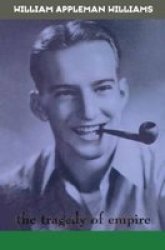Description
"I prefer to die as a free man struggling to create a human community than as a pawn of empire," wrote historian William Appleman Williams in 1976. Annapolis graduate and World War II Naval officer, civil rights activist and President of the Organization of American Historians, Williams (1921-1990) is remembered as the pre-eminent historian and critic of Empire in the second half of this century. More than any other scholar, he anticipated, encouraged and explained the attack of conscience suffered by the nation during the Vietnam War. Radicals have hailed him as a supreme anti-imperialist, while Libertarian conservatives have seen him as the "second Charles Beard," renewing the perspectives of the nation's foremost historian. Fellow historians consider him a great figure in American thought at large, one who looked for large patterns and asked the right questions. Williams' controversial volumes,
The Tragedy of American Diplomacy, Contours of American History, and other works have establishedhim as the foremost interpreter of US foreign policy. Both Williams and others deeply influenced by him have recast not only diplomatic history but also the story of pioneer America's westward movement, and studies in the culture of imperialism. At the end of the Cold War, when the US no longer faces any great enemy, the lessons of William Appleman Williams' life and scholarship have become more urgent than ever before. This study of his life and major works offers readers an opportunity to introduce, or re-introduce, themselves to a major figure of the last half-century.
